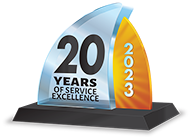Q: How do I assist my client companies in finding a DOT qualified SAP?
A: Provide your client companies with added value service by using SRS as your SAP referral source. SRS has a current network of DOT qualified Substance Abuse Professionals (SAPs) with offices in over 3000 locations nationwide and in Puerto Rico, the Virgin Islands Guam and Canada.
Q: Does SRS have DOT SAP providers in every state?
A: Yes, SRS has DOT qualified providers in over 3,000 locations nationwide and in Puerto Rico, the Virgin Islands, Guam and Canada.
Q: Is there any cost for using SRS as a SAP referral source for my clients?
A: SRS offers its services as a complimentary resource for TPAs, MROs and EAPs to share with client companies as added value service.
Q: Does an employer have to terminate an employee who violates a DOT drug or alcohol regulation?
A: No. That is a personnel decision that the employer has the discretion to make, subject to collective bargaining agreements or other legal requirements.
Q: How do I assist my client companies in finding a Non-regulated Substance Abuse Specialist?
A: Provide your Non-regulated client companies with added value service by using SRS as your substance abuse specialist referral source.
Q: Are my client companies responsible for payment of the SAP program?
A:. Payment for SAP evaluations and services is left for employers and employees to decide and may be governed by existing management-labor agreements and health care benefits.
Q: Can someone other than the employee direct that an MRO have the employee’s split specimen tested?
A: No. Because the split specimen exists to provide the employee with “due process” in the event that he or she desires to challenge the primary specimen’s results, only the employee can request that the split specimen be tested.
In addition, an employer or a union (or other labor representative) may not act on the behalf of the employee in requesting that the split specimen be tested.
The employee must make the request directly to the MRO.
Q: Can the MRO require an employee’s split specimen test request to be in writing rather than verbal?
A: 40.171(a) states that the employee’s request may be verbal or in writing. Therefore, the MRO must accept a verbal request.
The MRO may ask the employee for written documentation, but must immediately honor the verbal request.
An MRO should always document whether or not an employee requested to have the split tested. The MRO must document the date and time of the employee’s request
Q: If an employee requests his/her records from the MRO, do these records include the MRO’s notes and comments or only copies of the CCF and laboratory result?
A: In general, the MRO should provide all records that are available related to that employee, to include written notes, checklists, or comments. All of this information was obtained from the employee or from appropriate individuals or organizations (with the employee’s authorization) or from documentation provided by the employee.
Consistent with appropriate medical record constraints, the MRO may need to withhold or interpret sensitive medical, psychiatric, and mental health record information.
Q: Is it appropriate for the MRO to attempt to contact the employee after normal office hours?
A: Yes. Copy 2 of the CCF contains spaces for the employee’s daytime and evening telephone numbers. We expect MROs or their staffs to attempt to contact the employee at the evening phone number if the employee is not available at the daytime number.
Q: Because Part 40 requires collectors, MROs, BATs and STTs, and SAPs to maintain their own training records, can employers or training entities refuse to provide these service agents their training records?
A: No. Employers and trainers who provide training for these service agents must not withhold training documentation from them when they have successfully completed the training requirements. If a collector, BAT, STT, MRO, or SAP is not in possession of training documentation, he or she is in violation of Part 40. Therefore, Part 40 does not permit the withholding of such documentation from these service agents.
Q: If a C/TPA is hired as an “independent safety consultant” that executes all aspects of the employer’s safety and drug and alcohol testing programs, can the C/TPA act as a DER?
A: Service agents are prohibited from acting as DERs under any circumstances.
The fact that an organization that is called an “independent safety consultant” acts as a consultant to an employer for purposes of executing a drug and alcohol testing or safety program does not make it any less a service agent. It is still prohibited from acting as a DER.
Q: Who is responsible for notifying a collector that error correction training is needed?
A: The MRO, in canceling a drug test, will determine if the collector is at fault.
When the MRO reports the cancelled test to the employer, the MRO will note the reason for the cancellation and that, if appropriate, it was the result of collector error. The employer or service agent (e.g., MRO, C/TPA) designated by the employer is responsible for notifying the collection site of the error and the retraining requirement; and for ensuring that the training takes place.
Q: How should the employer’s decision to have a C/TPA act as intermediary in the handling of drug test results be documented?
A: When an employer chooses to use the C/TPA as the intermediary in the transmission of the MRO’s verified drug test results, this decision should be communicated from the employer to the MRO and the C/TPA.
We advise the MRO to obtain some documentation of the employer’s decision prior to sending results through the C/TPA.
Documentation could be in the form of a letter, an email, or record of a telephone conversation with the employer.
DOT also recommends that MROs maintain listings of the names, addresses, and phone numbers of C/TPA points of contact.
Call 410-668-8110
Or complete our Third Parties contact form to get started:


